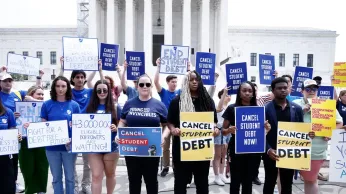
4 hours ago
Trump’s DOE Shuts Door on LGBTQ+ Nonprofit Workers Seeking Student Loan Forgiveness
READ TIME: 4 MIN.
Grab your morning coffee and buckle up, because the latest from Washington might just have you spitting it out: LGBTQ+ nonprofit workers—those everyday heroes fighting for equity and community care—are now on the Trump administration’s chopping block for student loan forgiveness. In a country where queer folks are already navigating economic minefields, this policy shift is not just a bureaucratic tweak, it’s a gut punch.
It’s official: The Department of Education (DOE) under President Trump has revised eligibility for the Public Service Loan Forgiveness (PSLF) program. Nonprofits dedicated to LGBTQ+ causes—especially those providing gender-affirming care, immigrant support, or advocacy for transgender youth—have been swept under the umbrella of organizations considered to serve a “substantial illegal purpose” by the administration. Translation: If your nine-to-five is at an LGBTQ+ nonprofit, your student loans no longer qualify for forgiveness.
Let’s break down the numbers. According to the Williams Institute, nearly a quarter of LGBTQ adults work in the public or nonprofit sectors—the exact population PSLF is supposed to help. That’s not just a statistic; it’s thousands of queer people who chose meaningful work over corporate salaries, believing their sacrifice would be rewarded with eventual financial relief. The Institute estimates over 2.9 million LGBTQ people hold federal student loans, with 51% of transgender adults, 36% of cisgender LBQ women, and 28% of cisgender GBQ men weighed down by this debt.
Let’s be real: For many in the LGBTQ+ community, student loans aren’t just a rite of passage—they’re often a lifeline. With reduced family support and systemic barriers to wealth, federal loans have been a bridge to independence and education. As Jorge Valencia, CEO of the Point Foundation, points out, “Student loans have been an important bridge out of poverty and towards independence for many people. LGBTQ+ individuals have been less likely to rely on family support for meeting the costs of higher education, making federal student loans all the more critical”.
This new policy doesn’t just hurt wallets—it sends a chilling message about whose labor is valued. For queer professionals who chose nonprofit careers as an act of resistance, compassion, or survival, it’s a slap in the face. The PSLF was designed to reward service, not punish it. Brad Sears, Distinguished Senior Scholar of Law and Policy at the Williams Institute, warns, “A recent executive order could potentially disqualify anyone working for an organization involved in gender-affirming care, or possibly those serving transgender individuals more broadly, from the PSLF program.”
So, why now? The Trump administration’s executive order, signed March 7, 2025, reframes “public service” to exclude any nonprofit whose work aligns with what it calls “substantial illegal purposes.” That includes organizations supporting gender-affirming care or immigration services—the very lifeblood of many LGBTQ+ nonprofits.
The order claims that these groups use federal support to “degrade our national interest,” a move that not only demonizes queer advocacy but equates it with threats to national security. The language is blunt, and the impact is brutal. By tying eligibility to political ideology, the administration is setting a precedent: service to marginalized communities is expendable, and activism is punishable with endless debt.
Let’s talk culture for a minute. The PSLF program was never just about money—it was a promise. It told queer social workers, HIV counselors, trans youth advocates, and nonprofit directors: “We see you. We value your labor. Your work matters.” Stripping that away reopens wounds felt for generations—where LGBTQ+ effort is erased, and queer resilience is met not with gratitude but with penalty.
For many, this hits home. Take the young trans counselor who took out loans to become a lifeline for runaway teens, believing her debt would be forgiven after a decade of service. Or the Black queer nonprofit director, who built community programs from scratch while carrying a financial burden that family wealth could never erase. These are real lives, now facing years more of bills, stress, and uncertainty—all because their work doesn’t fit a narrow definition of “public service”.
The news has sparked outrage across social media and within advocacy circles. Nonprofit leaders and grassroots organizers are mobilizing, flooding feeds with calls for solidarity and action. While some see this as another attack in a long history of anti-LGBTQ+ policies, others are using it as a rallying cry: to vote, to protest, and to amplify the stories of those directly affected.
For many, the fight isn’t just about restoring PSLF eligibility—it’s about demanding recognition for queer labor, affirming that advocacy is public service, and insisting that debt relief must not be wielded as a weapon of exclusion.
If you’re an LGBTQ+ nonprofit worker, you may be wondering what’s next. Experts recommend connecting with legal resources, advocacy organizations, and financial counselors to explore alternate debt relief options and stay informed as policies evolve. The fight for student loan justice isn’t over—and the queer community has never been one to back down.
In the meantime, the story continues to unfold. As the cultural and legal battlelines shift, queer voices will be at the forefront, demanding not just forgiveness, but dignity, equity, and recognition for the essential work they do. Stay loud, stay proud, and keep pushing—because this community knows how to turn setbacks into sparks for change.






